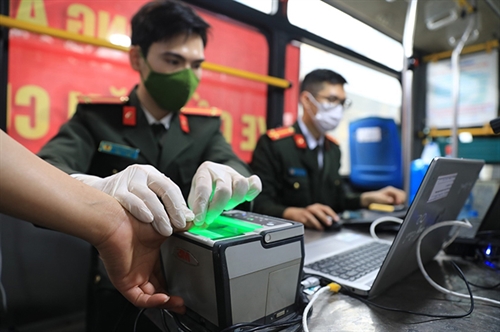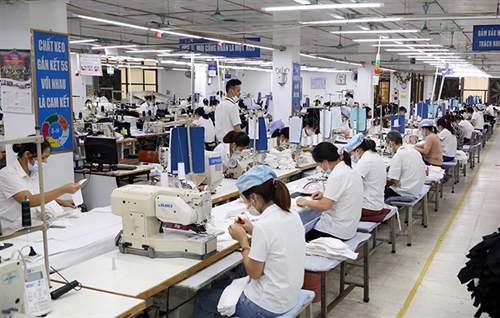Phan Thi Lan Phuong, LL.D.
Law Faculty
Vietnam National University, Hanoi
According to the Vietnam Competition and Consumer Authority, in recent years, consumer rights violations have become a common phenomenon[1]. Against that backdrop, the wide and rapid spread of the COVID-19 pandemic across the globe over the past three years has significantly changed the people’s consumption habits, opening up the door for new types of business, particularly those using digital platform-based apps. For their convenience, e-transactions have become an integral part of the people’s daily life. However, there remain limitations in the performance of e-transaction activities, such as poor awareness about consumer rights and business ethics, and inadequate implementation of provisions of the law on protection of consumer rights, which we should devise solutions to address.
This article provides an analysis of shortcomings and inadequacies in the implementation of regulations on protection of consumer rights in Vietnam in e-transactions, and propose recommendations for further improvement of the Law on Protection of Consumer Rights (the Law).
Inadequacies and shortcomings of the Law
Since its enactment in 2010, the Law has revealed numerous shortcomings, hindering the protection of consumer rights in the country.
Inadequacies of consumer-related definitions
With the rapid development of information technology around the world in general and in Vietnam in particular, consumers in traditional transactions have become different from those who purchase goods and services using digital platform-based apps and in the cyber environment, which makes it harder to apply the Law’s provisions in practice.
Therefore, the Law should provide clearer definitions which must take into consideration the increasing popularity of e-transactions.
 |
Limitations in the provisions on management of individual traders
Under Article 3.2.b of the Law, goods or service traders include also those engaged in independent and regular commercial activities which are not subject to business registration such as street vendors and bootblack. However, these persons are not required by law to register specific business locations as they constantly move from place to place for sale of small-value goods, foodstuff and fast food. That’s why it is hard to handle their acts of infringing upon consumer rights.
Despite the fact that Article 7 of the Law assigns market management boards to ensure quality, quantity and food safety for consumers who buy or use goods or services provided by such traders, it seems infeasible as the boards’ officers are not trained to perform such task.
Shortcomings in the protection of consumer rights in e-transactions
Apart from traditional types of transaction, at present more and more consumers choose to enter into Internet- and digital platform-based transactions for their high accessibility, diversity and convenience on both domestic and international markets even though they know that using these digital platforms may make them encounter the risk of buying counterfeit, pirated or poor-quality products, products of unclear origin, dishonest advertising, or suffering delivery delay[2].
Furthermore, when their acts of violating consumer rights are detected, digital platform-based sellers may shirk their responsibility just by locking or deactivating their selling accounts on the Internet, making it very difficult for purchasers to contact them, and therefore prolonging complaint resolution duration[3].
In addition, being involved in transactions on the Internet, consumers would also be at risk of having their personal information disclosed. In many cases, they are likely to receive goods from fake accounts or receive invitations for purchasing stuffs from unregistered traders online which are highly vulnerable to scams.
Inadequate provisions on operation of consumer rights protection organizations
The Law specifies responsibilities of social organizations involved in consumer rights protection but is silent about their powers and particularly financial resources for them to discharge their responsibilities. For example, Article 27.1 of the Law says that these organizations may participate in the consumer rights protection in accordance with their charters and have the right to file lawsuits against acts of violating consumer rights or act as representation for consumers or the community in protecting consumer rights. However, as these activities are not regarded as their state-assigned responsibilities, no funds will be allocated from the state budget for them to pursue lawsuits and pay charges for hiring lawyers, charge for evidence appraisal and court fee, etc.
Besides, in spite of being established on a voluntary basis and operating not for profit and assigned by law to represent consumer rights regardless of consumers’ nationality, religion, belief, professional qualifications and occupation, they still have no salary mechanism for their full-time members which obviously lessen their operational efficiency.
Inappropriate provisions on procedures for handling violations of consumer rights
Article 41.2 of the Law provides simplified procedures for settling cases of consumer rights protection. However, referring to Article 317 of the 2015 Civil Procedure Code (the Code) regarding conditions for settling civil cases according to fast-track procedures, we can see an inconsistency between relevant provisions of the Law and the Code.
The Code’s Article 317 says that the court will settle a case according to fast-track procedures only when all conditions specified in Clauses 1, 2 and 3 are satisfied. Such provision causes difficulties in the settlement of cases related to consumer rights protection while the Law’s mission is to protect interests of consumers who are disadvantaged in relation with sellers. For example, “the seller has admitted his obligation and evidences are sufficient” are conditions unfavorable for consumers. In reality, there are numerous cases in which sellers immediately shirk their responsibility after committing violations or goods are no longer intact, purchase invoices no longer exist or sale pages in the Internet disappear as soon as sellers’ violations are detected. Hence, it is quite difficult to meet all conditions for the application of fast-track procedures for resolving disputes between consumers and sellers.
Worthy of note, Article 30 of the Law specifies four modes of settling disputes between consumers and goods or service traders, including negotiation, mediation, arbitration and court trial. However, up to now, no specialized tribunal has been set up to handle cases in the field of consumer rights protection. In practice, very few cases have been resolved by the court and mediation and administrative sanctioning are the most used methods.
Other inappropriate provisions
Article 9.1 of the Law stipulates that one of obligations of consumers is “to check goods before receipt; to choose consuming goods or services of clear origin which do not harm the environment, are not contrary to fine customs and social ethics, do not harm his and others’ life and health; and to properly and fully follow use instructions for goods or services”. This provision is actually infeasible because consumers can only check some types of daily consumption goods meanwhile quality of many other types of goods cannot be judged with the naked eye. For example, unqualified medicines or consumer goods impregnated with chemicals for longer shelf life are products that only experts and special-use machines can detect. It can be seen through this provision that responsibility is left to consumers for protecting their own interests.
Article 12.3 of the Law is another impractical provision on the responsibility of goods and service traders “to notify consumers of goods’ or services’ possible harmful impacts on their health, life or property as well as preventive measures”. Such provision can hardly be implemented in reality because most businesses are operating on a small scale and have not been trained in how to identify which types of goods are qualified and suitable for consumers, so they are unable to provide proper warnings for consumers.
Recommendations for improvement of the Law
In order to address current legal limitations regarding the consumer rights protection, it is necessary to revise several concepts that no longer meet to requirements of transactions arising under new business conditions and replace a number of terms that appear inappropriate and inconsistent with relevant laws. The definition of “consumer” should also be clarified and broadened in order to provide consumers with more rights and interests in traditional transactions as well as transactions arising upon new modes of business.
With regard to the protection of consumers’ personal information in transactions conducted in cyberspace, the Law should be revised toward increasing the responsibility of business entities for protecting client information confidentiality.
The Law should also define more clearly the responsibility of goods or service traders to protect consumer rights against such prohibited acts as false advertising of goods or concealment of commodity information.
Authenticity of transactions conducted in cyberspace should also be supervised. Lawmakers should add provisions on rights and obligations of third parties involved in monitoring the authenticity of transactions and provide a mechanism to help prevent business entities from deleting their own sale accounts in cyberspace when their dishonest business activities are detected.
Provisions of Article 3.2.b of the Law regarding persons engaged in independent and regular commercial activities not subject to business registration should be revised to be stricter. Accordingly, in order to help facilitate the management of business activities of street vendors, bootblack or shipment traders, the Law should require these persons to make business registration and apply for a license to practice business, and develop a mechanism to inspect and supervise their business activities.
Regarding provisions concerning the Association for the Protection of Consumer Rights, the Law should be revised toward better facilitating the participation of social organizations in consumer rights protection activities and add provisions to increase rights and responsibilities of the Association, specify and increase expenditures for the Association’s activities to protect consumer rights, including those for hiring of lawyers and examination of evidences, when representing consumers in consumer rights-related lawsuits.
It should clearly state the number of full-time members of the Association, set criteria for and provide more rights and obligations of such persons so that they can be more committed to discharging their responsibility and improving the effectiveness of the consumer rights protection.
There should be more severe provisions on the responsibility of producers and traders to put goods for market circulation to match the obligation of consumers to select suitable goods specified in Article 9.1 of the Law.-









